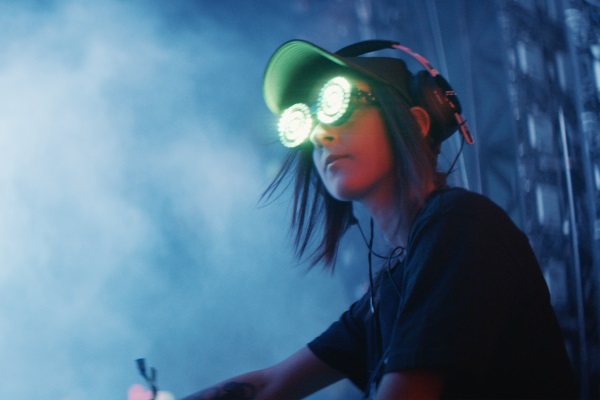This round up of some of the other films playing at Glasgow Film Festival 2021 is a disparate bunch, featuring closeted Romanian policemen, a raft of female DJs kicking against the pricks, and some tasty period swordplay from South Korea.
Poppy Field (Eugen Jebeleanu/ Romania/ 2020/ 81 mins) is a laudable attempt at depicting the many ways in which a closeted gay man can be pulled, especially in the case of policeman Cristi (Conrad Mericoffer), for whom discovery would be tantamount to career suicide. However, any sense of tension is nullified by a narrative mired in stasis and a theatrical two act structure, of which the first is the most interesting.
Jebeleanu’s film opens with Cristi spending time with his long-distance lover Hadi (Radouan Leflahi) and introducing Hadi to his sister (Cendana Trifan), who seems to still consider Cristi’s sexuality a phase and is clearly hostile to the idea. The second, longer act sees Cristi and his macho colleagues try to diffuse an anti-gay protest at a cinema, an event drawn from real-life. When Cristi meets a former lover amidst the (impressively staged) chaos, the cornered policeman lashes out.
Jebeleanu nicely employs his two locations to give a sense of the walls closing in on Cristi, and the muddled sympathies of the police between the protesters and the cinema goers. But the realist filming style clashes with the artificial conceit of the narrative, leaving the audience in a similar state of limbo as its protagonist, who is in the same place at the end of the day as he was at the beginning. Perhaps that is the point. 2/5.
Underplayed (Stacey Lee/ Canada/ 2020/ 87 mins) is an incisive documentary focused on the lack of opportunity for women to make a name for themselves in dance music. At the Wee Review, we are used to hearing about female and non-binary comedians being denied opportunities as, ‘There’s already one woman on the bill.’ The same attitude clearly permeates those at the top of the electronic music industry.
Lee interviews some of the few who have succeeded and achieved a place on DJ Magazine’s list of the Top 100 EDM DJ’s, including Rezz, Alison Wonderland, the twin sisters behind Nervo, and Tokimonsta. They all have different perspectives, but all fought the same issues of self-validation in an industry that scrutinised their looks before noting their talent. Even more sobering are the experiences of Tygapaw. Less than three percent of the industry’s production and technical roles are women. That drops to 0.3% for women of colour. As a queer Jamaican woman, the deck has been stacked against her all the more.
Underplayed is fascinating and inspiring from beginning to end, regardless of your opinion on the music. Indeed, it’s a situation that is endemic to the arts in general (there is also a class element that isn’t examined to the same depth, but lurks in the background nevertheless. The women interviewed all have distinct styles and stage presences and are all hugely engaging interviewees; the ebullient Rezz, and Nervo happily breastfeeding while being interviewed are particularly memorable. Both a celebration, a call to arms, and a challenge to the current structure of the industry, Underplayed is an exemplary music documentary. 4/5.
The Swordsman (Jae-Hoon Choi/ South Korea/ 2020/ 100 mins) transports the familiar iconography of the samurai movie to the less familiar environment of Joseon-period Korea. Falling somewhere between Zatoichi and The Man From Nowhere, the titular swordsman is Tae-yul (Jang Hyuk) a retired warrior who suffered damage to his sight years earlier during an insurrection. He is still very much a man to be reckoned with however, and when people traffickers led by Gurutai (The Raid and The Night Comes for Us badass Joe Taslim) kidnap his livewire daughter (Hyeon-soo Kim), he swings back into action.
A personal journey told against the large backdrop of political intrigue and Ming Dynasty interference in Joseon affairs, The Swordsman becomes slightly sluggish during the scenes of dynastic manoeuvring, and thick tongued with dry dialogue. But when Tae-yul unsheathes his distinctive double-pronged blade, it screams into life in a flurry of steel. Similar in pacing to Takashi Miike‘s 13 Assassins, the final 40 minutes or so is carnage all the way, and the beautiful little chime of Tae-yul’s sword as it sings like a lethal tuning fork is sweet indeed. The lithe Jang is an interesting hero, especially next to the imposing Taslim, who remains an unknown, sneering quantity until he too cuts loose in the closing stages.
There are themes of family, honour, and making the most of what you have before it’s lost, but that’s not why anyone’s here. The Swordsman does many familiar things, but as you would hope for a film that wears its heart in its title, it does them for the most part very, very well. 3/5.
All screening as part of Glasgow Film Festival 2021
